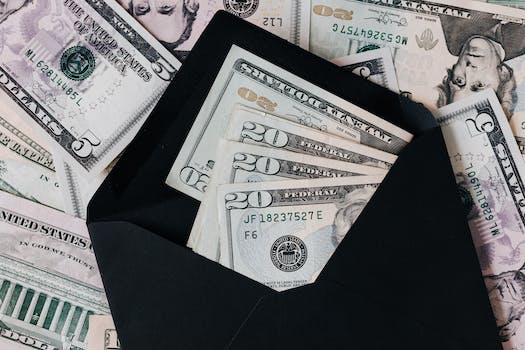How To Save Money With Inflation
Introduction

Inflation is a common economic phenomenon that affects the purchasing power of money. It occurs when the general price level of goods and services in an economy increases over time. As a result, the value of money decreases, and it becomes more expensive to buy the same goods and services. Inflation can have a significant impact on personal finances, making it essential to find ways to save money. In this article, we will discuss some practical tips on how to save money with inflation.
5 Tips for Budgeting During Inflation
Inflation is a term that is often thrown around in economic discussions, but what does it really mean for the average person? Inflation refers to the increase in the prices of goods and services over time. This means that the purchasing power of your money decreases as prices rise. Inflation can be a challenge for anyone trying to save money or stick to a budget. However, there are ways to save money even during times of inflation. Here are five tips for budgeting during inflation.
1. Track Your Expenses
The first step to budgeting during inflation is to track your expenses. This means keeping a record of everything you spend money on, from groceries to rent to entertainment. By tracking your expenses, you can identify areas where you may be overspending and make adjustments to your budget. You can use a spreadsheet or a budgeting app to help you keep track of your expenses.
2. Cut Back on Non-Essential Spending
During times of inflation, it’s important to cut back on non-essential spending. This means cutting back on things like eating out, buying new clothes, or going on expensive vacations. Instead, focus on the essentials, such as food, housing, and transportation. Look for ways to save money on these essentials, such as buying generic brands or carpooling to work.
3. Use Coupons and Discounts
Another way to save money during inflation is to use coupons and discounts. Many retailers offer coupons and discounts on their products, which can help you save money on your purchases. You can also look for deals on websites like Groupon or LivingSocial. Additionally, consider signing up for loyalty programs at your favorite stores, which can offer exclusive discounts and rewards.
4. Invest in Inflation-Protected Securities
One way to protect your savings from inflation is to invest in inflation-protected securities. These are bonds that are designed to keep pace with inflation, so your purchasing power is not eroded over time. Inflation-protected securities are issued by the government and can be purchased through a broker or financial advisor.
5. Consider a Side Hustle
Finally, consider starting a side hustle to earn extra income during times of inflation. A side hustle can be anything from freelancing to selling products online to driving for a ride-sharing service. By earning extra income, you can offset the effects of inflation and save more money for the future.
In conclusion, inflation can be a challenge for anyone trying to save money or stick to a budget. However, by tracking your expenses, cutting back on non-essential spending, using coupons and discounts, investing in inflation-protected securities, and considering a side hustle, you can save money even during times of inflation. Remember, the key to budgeting during inflation is to be proactive and make adjustments to your budget as needed. By doing so, you can protect your savings and achieve your financial goals.
How to Invest in Inflation-Proof Assets
Inflation is a term that is often used in the world of finance and economics. It refers to the increase in the prices of goods and services over time. Inflation can have a significant impact on our finances, as it reduces the purchasing power of our money. This means that the same amount of money can buy fewer goods and services than it could before. Inflation can be a challenge for those who are trying to save money, but there are ways to invest in inflation-proof assets that can help you save money in the long run.
One of the best ways to invest in inflation-proof assets is to invest in real estate. Real estate is a tangible asset that can appreciate in value over time. This means that the value of your investment can increase even as the value of your money decreases due to inflation. Real estate can also provide a steady stream of income through rental properties. This income can help offset the effects of inflation and provide a stable source of income for years to come.
Another way to invest in inflation-proof assets is to invest in commodities. Commodities are raw materials that are used to produce goods and services. Examples of commodities include gold, silver, oil, and agricultural products. Commodities can be a good hedge against inflation because their prices tend to rise when inflation is high. This means that if you invest in commodities, you can potentially earn a higher return on your investment than you would with other types of assets.
Investing in stocks can also be a good way to protect your money from inflation. Stocks represent ownership in a company, and the value of a stock can increase over time as the company grows and becomes more profitable. This means that if you invest in stocks, you can potentially earn a higher return on your investment than you would with other types of assets. However, it is important to note that investing in stocks can be risky, and you should always do your research before investing.
Finally, investing in bonds can be a good way to protect your money from inflation. Bonds are debt securities that are issued by companies or governments. When you invest in a bond, you are essentially lending money to the issuer. In return, the issuer pays you interest on your investment. Bonds can be a good hedge against inflation because the interest payments you receive can increase over time as inflation rises. This means that if you invest in bonds, you can potentially earn a higher return on your investment than you would with other types of assets.
In conclusion, inflation can be a challenge for those who are trying to save money. However, there are ways to invest in inflation-proof assets that can help you save money in the long run. Real estate, commodities, stocks, and bonds are all good options for those who are looking to protect their money from inflation. It is important to do your research and consult with a financial advisor before investing in any of these assets. With the right strategy, you can protect your money from inflation and achieve your financial goals.
Ways to Cut Costs and Save Money During Inflation
Inflation is a term that is often used in the world of economics. It refers to the increase in the prices of goods and services over time. Inflation can have a significant impact on our daily lives, especially when it comes to our finances. It can make it difficult to save money and can even lead to financial instability. However, there are ways to cut costs and save money during inflation.
One of the most effective ways to save money during inflation is to cut back on unnecessary expenses. This means taking a closer look at your spending habits and identifying areas where you can make cuts. For example, you may be able to save money by eating out less often or by canceling subscriptions that you don’t use. By reducing your expenses, you can free up more money to put towards savings.
Another way to save money during inflation is to shop around for the best deals. This means comparing prices at different stores and looking for sales and discounts. You may also want to consider buying in bulk, as this can often be more cost-effective in the long run. By being a savvy shopper, you can save money on everyday purchases and put more money towards your savings goals.
In addition to cutting back on expenses and shopping around for deals, it’s also important to be mindful of your energy usage. This means turning off lights and electronics when they’re not in use, using energy-efficient appliances, and adjusting your thermostat to save on heating and cooling costs. By reducing your energy usage, you can save money on your utility bills and put more money towards your savings.
Another way to save money during inflation is to consider alternative transportation options. This means walking, biking, or taking public transportation instead of driving. By reducing your reliance on your car, you can save money on gas, maintenance, and insurance. You may also want to consider carpooling with friends or coworkers to further reduce your transportation costs.
Finally, it’s important to be proactive about your finances during inflation. This means staying informed about economic trends and making adjustments to your budget as needed. You may also want to consider investing in assets that are likely to appreciate in value, such as real estate or stocks. By being proactive and strategic with your finances, you can protect yourself from the negative effects of inflation and set yourself up for long-term financial success.
In conclusion, inflation can be a challenging economic phenomenon to navigate. However, by cutting back on expenses, shopping around for deals, being mindful of your energy usage, considering alternative transportation options, and being proactive about your finances, you can save money and protect yourself from the negative effects of inflation. By taking these steps, you can set yourself up for long-term financial success and achieve your savings goals.
The Importance of Shopping Smart During Inflation
Inflation is a term that is often thrown around in economic discussions, but what does it really mean for the average person? In simple terms, inflation refers to the increase in the prices of goods and services over time. This means that the purchasing power of your money decreases as prices rise. Inflation can be caused by a variety of factors, including an increase in demand for goods and services, a decrease in supply, or changes in government policies.
One of the most important things to keep in mind during times of inflation is the importance of shopping smart. This means being mindful of the prices of the goods and services you are purchasing and making informed decisions about where to spend your money. Here are some tips for saving money during inflation:
1. Compare prices: One of the easiest ways to save money during inflation is to compare prices before making a purchase. This means shopping around and looking for the best deals on the items you need. You can do this by checking prices online, visiting different stores, or using price comparison websites.
2. Buy in bulk: Another way to save money during inflation is to buy in bulk. This is especially true for items that you use frequently, such as household essentials like toilet paper, cleaning supplies, and non-perishable food items. Buying in bulk can help you save money in the long run by reducing the cost per unit.
3. Use coupons and discounts: Coupons and discounts can be a great way to save money during inflation. Many retailers offer coupons and discounts on their products, and you can often find these online or in-store. Be sure to check the expiration dates and any restrictions before using them.
4. Shop at discount stores: Discount stores can be a great place to find deals on a variety of items. These stores often offer lower prices than traditional retailers, and they may also have a wider selection of products. Just be sure to check the quality of the items before making a purchase.
5. Consider alternative brands: During times of inflation, it may be worth considering alternative brands for the products you need. These brands may be less expensive than the ones you are used to, but they may still offer the same quality and functionality.
6. Plan your purchases: Finally, it is important to plan your purchases during times of inflation. This means making a list of the items you need and prioritizing them based on their importance. By planning ahead, you can avoid impulse purchases and focus on the items that are most essential.
In conclusion, shopping smart is essential during times of inflation. By comparing prices, buying in bulk, using coupons and discounts, shopping at discount stores, considering alternative brands, and planning your purchases, you can save money and make the most of your budget. Remember, every dollar counts during inflation, so it is important to be mindful of your spending and make informed decisions about where to spend your money.
Strategies for Paying Off Debt During Inflation
Inflation is a term that is often used in the world of economics. It refers to the increase in the prices of goods and services over time. Inflation can have a significant impact on our finances, especially when it comes to paying off debt. However, there are strategies that we can use to save money with inflation and pay off our debts more effectively.
One of the most effective strategies for paying off debt during inflation is to focus on paying off high-interest debt first. High-interest debt, such as credit card debt, can quickly accumulate and become unmanageable if left unchecked. By paying off high-interest debt first, we can reduce the amount of interest that we are paying and save money in the long run.
Another strategy for paying off debt during inflation is to make extra payments whenever possible. Even small extra payments can make a big difference over time. By making extra payments, we can reduce the amount of interest that we are paying and pay off our debts more quickly.
In addition to making extra payments, it is also important to avoid taking on new debt during inflation. This can be challenging, especially when we are faced with unexpected expenses or emergencies. However, by avoiding new debt, we can reduce the amount of interest that we are paying and save money in the long run.
Another strategy for paying off debt during inflation is to negotiate with creditors. Many creditors are willing to work with us to reduce our interest rates or create a payment plan that is more manageable. By negotiating with creditors, we can reduce the amount of interest that we are paying and pay off our debts more quickly.
Finally, it is important to create a budget and stick to it. A budget can help us to identify areas where we can cut back on expenses and save money. By sticking to a budget, we can reduce the amount of money that we are spending and use that money to pay off our debts more quickly.
In conclusion, inflation can have a significant impact on our finances, especially when it comes to paying off debt. However, there are strategies that we can use to save money with inflation and pay off our debts more effectively. By focusing on paying off high-interest debt first, making extra payments whenever possible, avoiding new debt, negotiating with creditors, and creating a budget, we can reduce the amount of interest that we are paying and pay off our debts more quickly. With these strategies in mind, we can take control of our finances and achieve our financial goals.
Conclusion
To save money with inflation, it is important to invest in assets that appreciate in value over time, such as stocks, real estate, and precious metals. It is also important to budget and cut unnecessary expenses, as well as shop around for the best deals and negotiate prices. Additionally, consider earning extra income through side hustles or freelance work. By taking these steps, individuals can protect their savings and maintain their purchasing power in the face of inflation.







